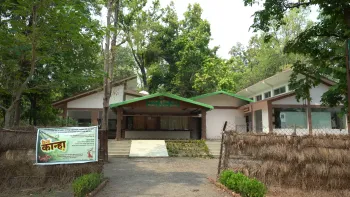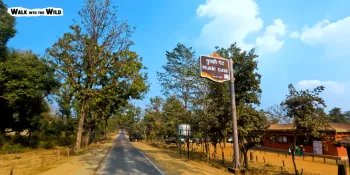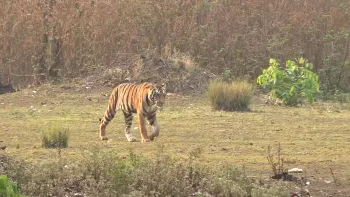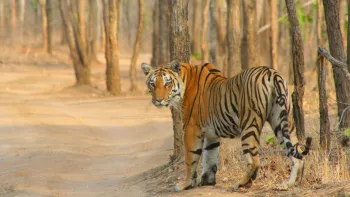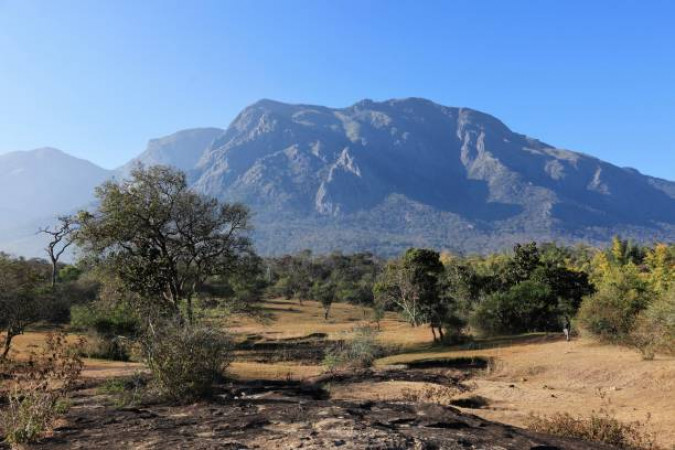
Mudumalai National Park
Package
6999 to 17999
6999 to 17999
Duration
2 to 4 Days
2 to 4 Days
Best time to visit
Mar-Jun, Sep-Nov
Mar-Jun, Sep-Nov
Theme
Wildlife
Wildlife
Mudumalai National Park Travel Guide
Mudumalai National Park is a renowned wildlife sanctuary located in the southern state of Tamil Nadu, India. Established in 1940, it is a part of the Nilgiri Biosphere Reserve and is rich in biodiversity. The park is known for its lush greenery, diverse flora and fauna, and stunning landscapes.Top Attractions in Mudumalai National Park
- Elephant Safari
- Tiger Reserve
- Bird Watching
- Jungle Trekking
- Visit to Moyar River
Mudumalai National Park is Famous for
Wildlife SafariTop Attractions in Mudumalai National Park
- Elephant Safari
- Tiger Reserve
- Bird Watching
- Jungle Trekking
- Visit to Moyar River
What's Great about Travelling to Mudumalai National Park?
- Perfect destination for nature lovers
- Great wildlife spotting opportunities
- Peaceful and serene environment
What's Not So Great about Travelling to Mudumalai National Park?
- Limited accommodation options
- Remote location may require long travel hours
- Weather can be unpredictable
Travel Tips for Mudumalai National Park
- Obtain necessary permits for entry
- Wear comfortable clothing and footwear
- Follow safety instructions during safaris
Important Mudumalai National Park trip information
- Ideal Duration: 2-3 days
- Best Time to Visit: November to June
- Nearby Airports and Railway Stations: Coimbatore Airport, Ooty Railway Station
Per Person
24,800
*EXCLUDING APPLICABLE TAXES 4.8 Ratings
( 33 Reviews )
( 33 Reviews )
Per Person
2,82,000
*EXCLUDING APPLICABLE TAXES 5.0 Ratings
( 438 Reviews )
( 438 Reviews )
Per Person
18,500
*EXCLUDING APPLICABLE TAXES 5.0 Ratings
( 438 Reviews )
( 438 Reviews )
Per Person
14,250
*EXCLUDING APPLICABLE TAXES 5.0 Ratings
( 438 Reviews )
( 438 Reviews )
Per Person
18,500
*EXCLUDING APPLICABLE TAXES 5.0 Ratings
( 438 Reviews )
( 438 Reviews )
Per Person
15,000
*EXCLUDING APPLICABLE TAXES FAQ's on Mudumalai National Park
Q1: What is the best time to visit Mudumalai National Park?
The best time to visit Mudumalai National Park is from October to May when the weather is pleasant, and wildlife sightings are more frequent. Avoid the monsoon season from June to September due to heavy rainfall. The peak tourist season is from December to February when the weather is cool and ideal for safaris.
Q2: Do I need a visa to travel to Mudumalai National Park?
Foreign tourists visiting Mudumalai National Park will need a valid Indian tourist visa. Some nationalities may be eligible for e-Visa facilities. It's advisable to check with the Indian embassy or consulate in your country for specific visa requirements.
Q3: What are the must-visit attractions in Mudumalai National Park?
Must-visit attractions in Mudumalai National Park include the wildlife safari, Elephant Feeding Camp, Theppakkadu Elephant Camp, Moyar River, and the scenic Ooty town nearby. The park offers opportunities for bird watching, jungle treks, and exploring the rich biodiversity of the Western Ghats.
Q4: Is Mudumalai National Park a safe place to travel?
Mudumalai National Park is generally safe for tourists. However, it's important to follow the guidelines provided by park authorities during safaris and avoid straying off designated paths. Be cautious of wildlife encounters and follow safety instructions from guides.
Q5: What is the local currency in Mudumalai National Park and can I use credit cards?
The local currency in Mudumalai National Park is the Indian Rupee (INR). While credit cards may be accepted in larger establishments, it's advisable to carry cash for smaller purchases. ATMs are available in nearby towns like Masinagudi and Ooty.
Q6: What is the local cuisine like in Mudumalai National Park?
The local cuisine in Mudumalai National Park offers a mix of South Indian flavors with traditional tribal dishes. Must-try dishes include biryani, dosas, idlis, and local tribal specialties like bamboo shoot curry and millet-based dishes. Vegetarian and non-vegetarian options are available to cater to different preferences.
Q7: What transportation options are available in Mudumalai National Park?
Transportation options in Mudumalai National Park include private vehicles, local buses, and taxis for getting around the park and nearby areas. Safari jeeps are provided for wildlife tours within the park. Car rentals and guided tours are also available for convenient travel.
Q8: Are there any cultural norms or etiquette I should be aware of when visiting Mudumalai National Park?
When visiting Mudumalai National Park, it's important to respect local customs and traditions. Dress modestly, especially when visiting tribal villages. Avoid littering and disturbing the wildlife. Seek permission before taking photographs of locals or tribal communities. Learning a few basic phrases in the local language can also enhance your travel experience.
Q9: I am a travel agent. How can I buy travel leads of Mudumalai National Park?
Register yourself as a travel agent at agents.tripclap.com and then you can buy travel leads to Mudumalai National Park once your account is approved. For more details contact our support team at +91-8069186564 or support@tripclap.com
![Meghalaya with kaziranga 6N/7D tour package LD- 517577 [Based on 2 Adults]](https://static.tripclap.com/uploads/package/350X200/1763018166-1763018166-1051e.webp)

